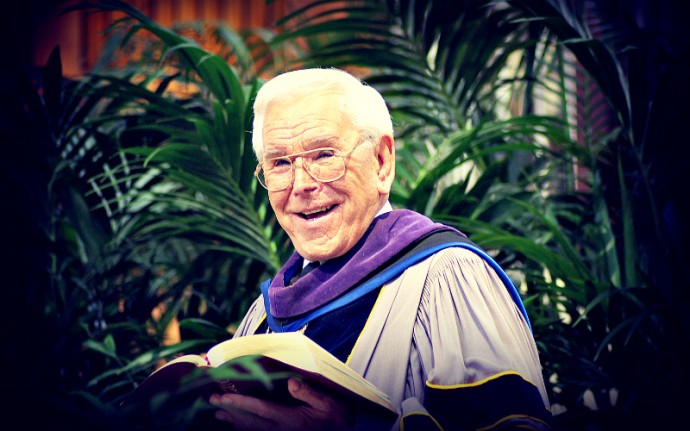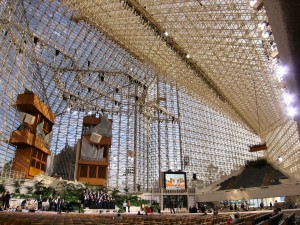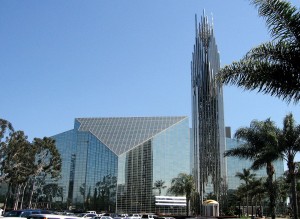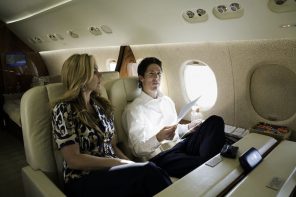“A rock pile ceases to be a rock pile the moment a single man contemplates it, bearing within him the image of a cathedral,” the French poet Antoine de Saint-Exupery, wrote.
When the Rev. Robert H. Schuller saw the concession stand of a southern California drive-in movie theater in 1955, his imagination bore the blueprints for a crystalline cathedral and thoroughly-modern ideas about spreading the Christian Gospel via television.
Schuller, founder of the now-defunct Crystal Cathedral in Garden Grove, Calif., and the long-running spiritual television program Hour of Power, died Thursday after a lengthy battle with esophageal cancer. He was 88.
A native of tiny, rural Alton, Iowa, Schuller was an ordained minister of the Reformed Church in America and served a congregation in Chicago before his denomination asked him to move to Southern California and plant a church.
With his wife Arvella (who died last year) serving as organist and “$500 in assets, he rented the Orange Drive-In Theatre and conducted Sunday services from the tarpapered roof of its snack bar,” according to Schuller’s biography on the Hour of Power website. “One hundred persons attended that first Sunday, all in their cars. Dr. Schuller, who believe[d] this outdoor ministry experience helped inspire him to later build the all-glass Crystal Cathedral, often state[d], ‘It was there I fell in love with the sky!’”
Schuller’s congregation became the world’s first “walk-in-drive-in” church and soon thereafter, reportedly at the Rev. Billy Graham’s urging, he began broadcasting services from its sanctuary as Hour of Power. By 1975, with the program was airing in all 50 states and the local congregation booming, Schuller and his flock decided to build the Crystal Cathedral — the “first-ever all-glass church,” according to the web site. The building, with its 10,000 panes of glass, seating for more than 2,700, and one of the world’s largest instruments — the Hazel Wright organ —was completed at a cost of $18 million and dedicated in 1980.
In 2011, after mounting financial problems and infighting among church staff — including a rift between Schuller and his son (and heir apparent) the Rev. Robert Schuller, Jr., over the direction of church ministry — the Crystal Cathedral filed for bankruptcy, eventually reaching a $57.5 million agreement with the Roman Catholic Diocese of Orange to purchase the gleaming architectural icon of American Protestantism.
The elder Schuller preached his last sermon at the cathedral in 2012, when he and his wife, Arvella, resigned from active ministry. Their remaining congregation, known as Shepherd’s Grove, moved into a decommissioned Catholic church with half the seating capacity of the cathedral and is now led by Schuller’s grandson, Bobby Schuller.
Word of Schuller’s death spread quickly Thursday, with the first announcement coming from his daughter-in-law, Donna, via Twitter.
Christianity Today magazine described Schuller as the “forerunner of the seeker-sensitive movement” in evangelical Christianity, one that has “much to teach Christians about missional creativity and loving those far away from the church.”
Richard Mouw, former longtime president of Fuller Seminary in Pasadena, Calif., who now serves there as a professor of faith and public life, was a close friend of Schuller. “He was the one of the great religious leaders of the 20th century using his wonderful, therapeutic messages,” Mouw told public radio station KPCC’s “Air Talk” program Thursday afternoon.
“Evangelicalism at its best wants to be innovative and reach people,” said Timothy Larsen, a professor of Christian thought at Wheaton College in Illinois, told CNN. “And Schuller was a master at that….What he got right is that the gospel is good news and he preached an uplifting message about personal transformation and uplift and hope.”
Like that of one of his mentors, Norman Vincent Peale, Schuller’s Gospel message was happy, down-to-earth, and eminently quotable. He is one of the vanguard of American evangelicalism who paved the way for the success of contemporary evangelists and motivational speakers such as Joel Osteen and even, to a certain extent, Oprah Winfrey. who combine spirituality with self-worth-boosting messages.
A generation (or two) before Osteen and Winfrey became household names, Schuller was a spiritual tastemaker, trendsetter, and celebrity himself. A 1983 Los Angeles Times profile titled “The time Muhammad Ali asked for Robert Schuller’s autograph,” concluded with the now prescient lines:
When he sees all the other elegant churches and synagogues of the world divesting themselves of their wealth, “Then, you bet, Robert Schuller will be the first to join them. I’ll dismantle the Crystal Cathedral myself—piece by piece—when that day comes.”







